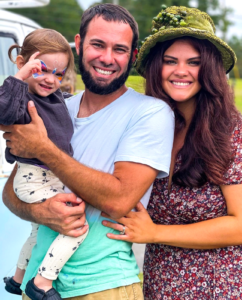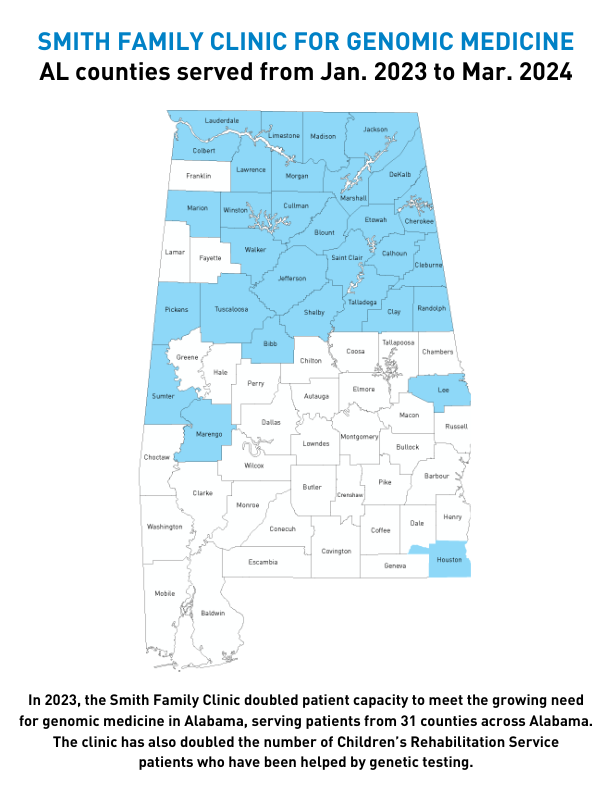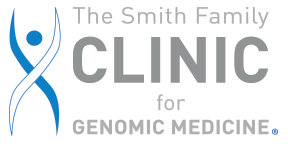By Lillie Mermoud
At just three years old, Jovi Cox is the youngest reported person to be diagnosed with Usher Syndrome Type IV. This is a genetic condition that causes hearing and vision loss, but patients with Type IV don’t usually have symptoms until later in life.

Jovi doesn’t currently have all the symptoms associated with Usher syndrome, but her condition might change as she gets older. Right now, she has moderate hearing loss, but her diagnosis means she could experience vision loss or a further decrease in her hearing abilities. Early intervention is crucial to supporting Jovi’s development so she can live life to the fullest.
Jovi, an outgoing and sassy toddler from Woodstock, Alabama, received her diagnosis thanks to the state’s Children’s Rehabilitation Service (CRS) partnership with the Smith Family Clinic for Genomic Medicine, LLC (SFC), a nonprofit genetics clinic on the campus of HudsonAlpha Institute for Biotechnology in Huntsville, Alabama.
“We’re thankful we found out so early about her diagnosis,” said Kate Cox, Jovi’s mother. “We may not know what the future holds since she is the only child to be diagnosed so young, but because of genetic testing, we know that we have everything we need to help her in life.”
Improving access to healthcare across Alabama
Nearly 22 percent of children in Alabama, or more than 233,000 children, have a special healthcare need. CRS, a division of the Alabama Department of Rehabilitation Services (ADRS), is a statewide system of healthcare professionals devoted to making healthcare accessible to children ages 0 to 21 and their families throughout all counties in Alabama.
Supporting a child with complex healthcare needs can be physically, emotionally, and financially demanding for families. To relieve some of that stress, CRS connects families with physicians, social workers, therapists, and more to provide support.

Jovi was referred to CRS because of her need for hearing aids. CRS handles audiology tests and hearing aid fittings for children, recognizing that hearing loss at such a young age is often associated with a more complex condition. From there, Jovi’s audiologist recommended genetic testing through the CRS, which brought the Cox family to the Smith Family Clinic.
“There had always been little signs of something underlying,” said Kate.
“Jovi always asked for the volume to be turned up when we watched a movie or listened to music. When she failed her hearing test after an ear infection, that’s when we turned to the CRS for help.”
Genetics for all
Support within the CRS system includes access to CRS’s specialty medical clinics, which are offered through clinician partnerships across the state. CRS makes specialty clinics more accessible to those who might otherwise face barriers to access.
 The SFC serves as the CRS Genetics Clinic and is the only genetics clinic within the network. The SFC uses genetic testing, genetic counseling, and whole genome sequencing to identify genetic diagnoses.
The SFC serves as the CRS Genetics Clinic and is the only genetics clinic within the network. The SFC uses genetic testing, genetic counseling, and whole genome sequencing to identify genetic diagnoses.
Genetic testing is a powerful tool for identifying a potential genetic cause behind patients’ unexplained symptoms, physical birth differences, or disabling conditions – the type of special healthcare needs CRS clients are faced with.
“Our partnership with CRS has brought tremendous value to families who need genetic medicine but would typically face barriers to access this type of care,” said Meagan Cochran, MS, CGC, Director of the Smith Family Clinic. “We’re grateful for the opportunity to help the families our organizations serve across Alabama to care for their children.”
The partnership between CRS and SFC came about naturally after CRS staff members toured the clinic shortly after it opened in 2015. CRS was considering including genetics as a part of its system. After hearing a presentation from Dr. Greg Cooper, a HudsonAlpha Faculty Investigator who specializes in genomic research to better understand rare diseases, the organization realized how much patients could benefit from access to genomic medicine.
The goal of the partnership is to help as many families as possible to feel as informed and understood as the Cox family, while also tearing down the barriers that prevent many families from accessing genetic medicine.
“Even though our patients are receiving treatments for their symptoms, the families may have never received a diagnosis or a reason for their children’s health conditions,” said Tammy Meyer, LMHC, CRS District Supervisor for Huntsville and Muscle Shoals. “CRS and Smith Family Clinic planned a partnership because of how important a diagnosis is for a child’s care plan.”
The benefits of genetic testing and genetic counseling
Having a genetic diagnosis gives families caring for a child with special healthcare needs a better understanding about what their child faces today, as well as what the future could hold. A diagnosis informs parents whether their child needs earlier or advanced screenings or preventative measures and helps anticipate the need for future treatments or therapies.
“Families who have participated in the Smith Family CRS Genetics Clinic have clarity on treatment plans and on goals for their child’s future,” said Meyer. “This information is empowering and helps families take a more active role in advocating for their child’s health and well-being.”
When Kate Cox shares Jovi’s experience with CRS and the SFC, she emphasizes the amount of support her family received from both parties. Through CRS’s guidance on Jovi’s care, she feels as if she has all the resources she needs to support Jovi as she grows up. “CRS made me feel like we weren’t alone and like we have a direction, even if we don’t know what the future will hold.”
Working in tandem with CRS, the SFC helped Kate understand the challenges Jovi faces and offered reassurance that despite her Usher syndrome diagnosis, Jovi can continue to develop and thrive. “We felt like the team at the Smith Family Clinic cared and wanted to ensure we were well informed. We felt like we were well taken care of.”
Genetics for a brighter future
 By working together, CRS and the SFC make it possible for children like Jovi to receive a life-changing diagnosis. For Jovi, her Usher syndrome Type IV diagnosis is a global first that left her family with more questions than answers. But, that same diagnosis gave Jovi the resources to take on whatever the future holds.
By working together, CRS and the SFC make it possible for children like Jovi to receive a life-changing diagnosis. For Jovi, her Usher syndrome Type IV diagnosis is a global first that left her family with more questions than answers. But, that same diagnosis gave Jovi the resources to take on whatever the future holds.
With CRS’s help, Kate is preparing Jovi for a possible decrease in her ability to see and hear by setting up appointments with speech and occupational therapists. Therapy will help Jovi learn Braille and American Sign Language before she even loses her eyesight or experiences more severe hearing loss.
For Kate, another silver lining to Jovi’s genetic diagnosis is the possibility of helping future families whose children might face the same challenges. Because Jovi’s case is so unique, the team at the SFC is keeping close contact with the Cox family, aiming to better understand how Jovi’s symptoms evolve to know how to treat future pediatric patients with Usher syndrome Type IV.
“Knowing Jovi’s case will be accessible to other people in our position is comforting because we’re going to do everything we can for her. Because of us, hopefully people will know what to do,” said Kate. “In the meantime, because of her diagnosis, I know she will be well-equipped to be successful as she grows up. She has more opportunities to prepare for what’s to come.”
Children’s Rehabilitation Service (CRS), a division of the Alabama Department of Rehabilitation Services, is a statewide system of services for children with special health care needs and their families, and adults with hemophilia. If you believe you or your child qualify for CRS care, contact the CRS office nearest to you for further instructions on how to securely submit your information, or call 800-846-3697.
The Smith Family Clinic for Genomic Medicine offers appointments for children with special healthcare needs as the CRS Genetics Clinic, but also offers appointments for children and adults outside of the CRS network. Learn more about available services.


